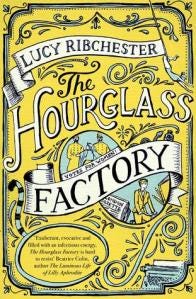The Hourglass Factory by Lucy Ribchester

Set mainly in November 1912 among the chaos of suffragette-besieged London, this debut novel is a rip-roaring rollercoaster of a romp through Edwardian society.
Frankie George (Francesca to her mother) is a trouser-wearing twenty-something reporter for the London Evening Gazette, relegated to the Ladies' Page due to her gender (and, if we're honest, her inexperience). With ageing ex-courtesan 'Twinkle' she writes week after week about fashion and high society when what she really wants is breaking news. Ebony Diamond is a suffragette who is also a trapeze artist, and when she goes missing shortly after Frankie tries to interview her, Frankie decides she could be on to something.
What follows is an adventure through hidden London, taking in the circus, Soho clubs, fetishists, suffragettes and sensationalist reporters. It's done with a light touch despite featuring a couple of murders, and the outrageous character of Twinkle provides some highly amusing interludes.
Although the suffragettes feature heavily, I would say this novel is more about independence than about suffragettes specifically. Working women, trouser-wearing women, women who've left their husbands or want the vote, but in all cases don't want the conventional life set down for them at birth. It makes for some odd alliances, and shows how it's possible to be forward-thinking in one respect but utterly closed-minded in others.
Frankie was an endearingly flawed character, liable to go off half-cocked, untidy and disorganised, constantly broke and seemingly forever noticing how bad she smelt (sleeping in her only clean shirt yet again). The 'Sapphic tendencies' people kept accusing her of were never explicitly confirmed, but it added an extra dimension to the struggle for independence. She was generally optimistic and trying hard to help others and further her career.
That dilemma at the heart of her journalistic efforts was another good strand of the book. Just because it's a good story doesn't mean you should publish it, it could ruin lives. How far is she willing to go for her newspaper career?
Lucy Ribchester had obviously done plenty of historical research (and then played fast and loose with bits of it, as any good historic fiction writer needs to), but at times it did feel a bit like she'd thrown everything and the kitchen sink at the book. There were a couple of circumstances or sub-plots that I assumed would become relevant later, but never seemed to.
I wouldn't be sure how to categorise this novel. Historical fiction yes, but with humour and a modern touch that made me (who has read a fair bit of steampunk) keep expecting it to take off on a flight of fancy. In a way that was supplied by the trapeze element, I certainly learnt more about circus performers than suffragettes from reading The Hourglass Factory. There was a murder investigation running through the book, but it wasn't really a whodunnit. There is an element of thriller later on as facts come together and the race is on. In the end it's about Frankie trying to get on with life on her own terms, and landing herself in varying amounts of trouble and friendship along the way.


